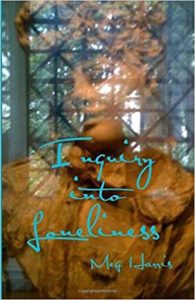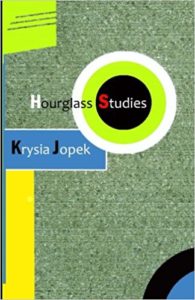Inquiry into Loneliness and Hourglass Studies

 Inquiry into Loneliness,
Inquiry into Loneliness,
by Meg Harris, Crisis Chronicles Press, 2017,
26 pages, paper, $7, ISBN: 978-1-940996-45-5.
Hourglass Studies,
by Krysia Jopek, Crisis Chronicles Press, 2017,
26 pages, paper, $7, ISBN: 978-1-940996-46-2.
How do we invoke the divine in ourselves, or others? Meg Harris might know, as she is a divine dweller / searcher, finding and evoking what is both holy and mundane in a fine collection of new poems, Inquiry into Loneliness, published by John Burroughs of Crisis Chronicles Press.
These are not necessarily religious or faith-based poems, unless one can conceive of loneliness as a new pathway into consciousness or perhaps stillness, but still, some of Harris’s poems do seem to enter into spaces we might have overlooked, as in “Apnea,” when she writes, “This poem is technical yet angelic, / the word apple is in it / and something about the blush of sleep.” This isn’t the kind of angel imagery of an enlightened being, but more of a humble observer of human relationships, and quite surprisingly she leads us to the inevitable and maybe even unwanted state of loneliness by which all of us are nearly always confused or disturbed.
She writes, in “Sloth,” of “days when stillness, like a death, is the place where / I’m suspended. There, sometimes for hours, I hang.” Of course, her intention in “Sloth” was to write a sestina about these slowpokes of the forest, yet instead, she’s composed a wonderful meditation on the lulling words of “sleep, bough, suspend, hermit, nocturnal and sloth.” By the end of her inquiry, we’re much more in touch with what sloths and humans have in common, especially if one has entered the world of the recluse, as Harris has.
So, we are a “mythology . . . of aliens and angels . . . almost nothing.” Yet her collection is a celebration of light and airiness, though her poems take us into a world of loneliness that opens, not closes, our hearts to sorrow and grief, but equally to keen insights into how these moments of tenderness can teach us how to embrace, and not shy away from, what we’re often troubled by when loneliness visits. Her book isn’t a testimony, but rather a wonderfully engaging journey into “the un-certainty / of the happy yes of loss.”
Philosopher-poet Krysia Jopek brightens the world with a mind-gazing new collection of poems, Hourglass Studies, just released from John Burroughs of Crisis Chronicles Press. Her new collection of high energy twists is the culmination of poetry studies that began with her interests in fusing the abstract with L-A-N-G-U-A-G-E poetry, and, as a result, the poems are challenging to the mind, a heartfelt exploration designed to appease even “the most stubborn philosophers” (V:4).
To orient the reader, Jopek has composed twelve prose poems, with each of the twelve “studies” including twelve mind- whoppingly pensive prose fragments. What she offers for us as readers is what few of us ever have time for — the opening of the mind into unknown crannies, where new speculations can help us see the evolving world of language and language-oriented possibilities.
From section XII:3, Jopek offers us the key to her collection: “The hourglass flipped the conversation over. How to end when one doesn’t recognize the beginning?” Exactly. If we have been flipped by these terse ideograms / epitaphs, then we can learn to set aside narrative theories for sheer speculation on the nature and function of experimental poetry. Readers hoping to find connections between these hourglass studies might have to rewire their synapses, in order to balance the disconnect between one unit of poetry and another. But that’s what’s refreshing about Jopek’s collection.
Hourglass Studies will challenge, with its words shaped into fiery syntax, but after a few readings, the reader will start to make sense of what might first appear nonsensical. Here is I:9: “Reflecting abandoned cities, the train flows past. A mathematical problem deferred [like [an] Echo.]” Readers who love and expect words to flow and connect in conventional ways will be tripped up by Jopek’s unconventional constructions. Instead, we can simply take delight in the fusion of unpredictable meditations. Let III:9 set the mind in a new direction: “A poetics can be given, poorly explained summarized only at / one point: a permanent transition, a steady fraction-glimpse, / delicately spun.” It’s that delicate spin of language that makes Hourglass Studies a challenging puzzle, or escape, or conundrum — depending, of course, on the orientation of the reader. If one is familiar with experimental language poetry, these meditations amplify what all poetry needs as a jolt from the norm. So, to fully appreciate Jopek’s reflections, one might start by simply ignoring the importance of narrative or lyricism, and instead just enjoy her wildly imaginative juxtapositions of images and cognitive somersaults. Jopek playfully helps us to see such unknowns in X:i: “Sentences drag luminous solitudes into the sea at dawn / dislocating ______________.”
We might feel dislocated in reading her synaptic leaps, but perhaps we can also feel that dislocation is a way to open ourselves to what we’ve not been able to see before, especially as in XII:11: “[if space is hollow or open].” It’s the space of language that Jopek hopes we’ll consider, and after looking at space for so long in the same way, I’m ready for some new lenses.
— DeWitt Clinton

